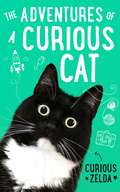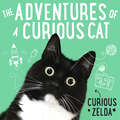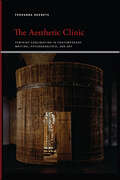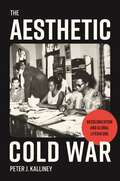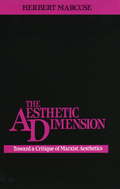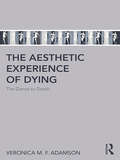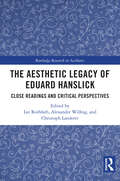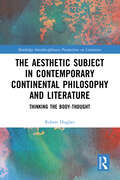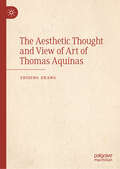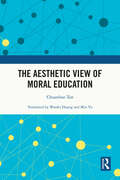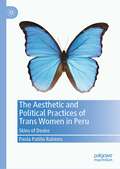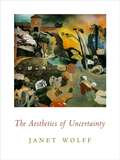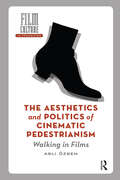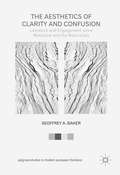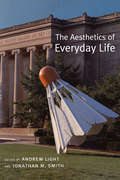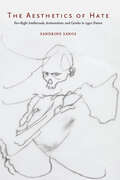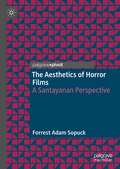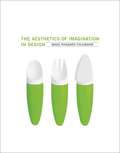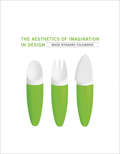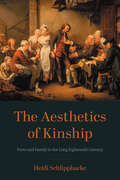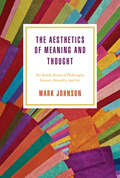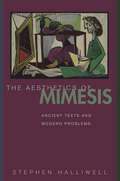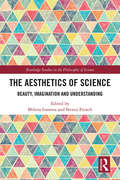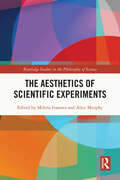- Table View
- List View
The Adventures of a Curious Cat: wit and wisdom from Curious Zelda, purrfect for cats and their humans
by Curious Zelda'A purrfect gift for a loved one with a special affinity for the feline' 'An absolute must for any cat lover''Curiosity is more than a desire to discover. It's a lifestyle, and a purrvilege. It's hours of observing a fly on the wall. It's entering the sock drawer just before it closes. It's sniffing the lampshade one more time . . .'Such is the wisdom of Curious Zelda: social media star, agony aunt, yoga teacher, cat. In The Adventures of a Curious Cat she gives insight into her view of the world and dispenses unparalleled wisdom. Zelda explains, in her unique voice, how to handle humans, how to communicate with furniture, and most importantly how to live a life curiously. It's the ultimate self-help guide for any cat, or indeed, their human.
The Adventures of a Curious Cat: wit and wisdom from Curious Zelda, purrfect for cats and their humans
by Curious Zelda'A purrfect gift for a loved one with a special affinity for the feline''An absolute must for any cat lover''Curiosity is more than a desire to discover. It's a lifestyle, and a purrvilege. It's hours of observing a fly on the wall. It's entering the sock drawer just before it closes. It's sniffing the lampshade one more time . . .'Such is the wisdom of Curious Zelda: social media star, agony aunt, yoga teacher, cat. In The Adventures of a Curious Catshe gives insight into her view of the world and dispenses unparalleled wisdom. Zelda explains, in her unique voice, how to handle humans, how to communicate with furniture, and most importantly how to live a life curiously. It's the ultimate self-help guide for any cat, or indeed, their human.
The Adventures of a Curious Cat: wit and wisdom from Curious Zelda, purrfect for cats and their humans
by Curious Zelda'Curiosity is more than a desire to discover. It's a lifestyle, and a purrvilege. It's hours of observing a fly on the wall. It's entering the sock drawer just before it closes. It's sniffing the lampshade one more time . . .'Such is the wisdom of Curious Zelda: social media star, agony aunt, yoga teacher, cat. In The Adventures of a Curious Cat she gives insight into her view of the world and dispenses unparalleled wisdom. Zelda explains, in her unique voice, how to handle humans, how to communicate with furniture, and most importantly how to live a life curiously. It's the ultimate self-help guide for any cat, or indeed, their human.
The Aesthetic Clinic: Feminine Sublimation in Contemporary Writing, Psychoanalysis, and Art (SUNY series, Insinuations: Philosophy, Psychoanalysis, Literature)
by Fernanda NegreteIn The Aesthetic Clinic, Fernanda Negrete brings together contemporary women writers and artists well known for their formal experimentation—Louise Bourgeois, Sophie Calle, Lygia Clark, Marguerite Duras, Roni Horn, and Clarice Lispector—to argue that the aesthetic experiences afforded by their work are underwritten by a tenacious and uniquely feminine ethics of desire. To elaborate this ethics, Negrete looks to notions of sublimation and feminine sexuality developed by Freud, Baudelaire, Mallarmé, and Nietzsche, and their reinvention with and after Jacques Lacan, including in the schizoanalysis of Gilles Deleuze and Félix Guattari. But she also highlights how psychoanalytic theory draws on writing and other creative practices to conceive of unconscious processes and the transformation sought through analysis. Thus, the "aesthetic clinic" of the book's title (a term Negrete adopts from Deleuze) is not an applied psychoanalysis or schizoanalysis. Rather, The Aesthetic Clinic privileges the call and constraints issued by each woman's individual work. Engaging an artwork here is less about retrieving a hidden meaning through interpretation than about receiving a precise transmission of sensation, a jouissance irreducible to meaning. Not only do art and literature serve an urgent clinical function in Negrete's reading but sublimation itself requires an embrace of femininity.
The Aesthetic Cold War: Decolonization and Global Literature
by Peter J. KallineyHow decolonization and the cold war influenced literature from Africa, Asia, and the CaribbeanHow did superpower competition and the cold war affect writers in the decolonizing world? In The Aesthetic Cold War, Peter Kalliney explores the various ways that rival states used cultural diplomacy and the political police to influence writers. In response, many writers from Africa, Asia, and the Caribbean—such as Chinua Achebe, Mulk Raj Anand, Eileen Chang, C.L.R. James, Alex La Guma, Doris Lessing, Ngũgĩ wa Thiong'o, and Wole Soyinka—carved out a vibrant conceptual space of aesthetic nonalignment, imagining a different and freer future for their work.Kalliney looks at how the United States and the Soviet Union, in an effort to court writers, funded international conferences, arts centers, book and magazine publishing, literary prizes, and radio programming. International spy networks, however, subjected these same writers to surveillance and intimidation by tracking their movements, tapping their phones, reading their mail, and censoring or banning their work. Writers from the global south also suffered travel restrictions, deportations, imprisonment, and even death at the hands of government agents. Although conventional wisdom suggests that cold war pressures stunted the development of postcolonial literature, Kalliney's extensive archival research shows that evenly balanced superpower competition allowed savvy writers to accept patronage without pledging loyalty to specific political blocs. Likewise, writers exploited rivalries and the emerging discourse of human rights to contest the attentions of the political police.A revisionist account of superpower involvement in literature, The Aesthetic Cold War considers how politics shaped literary production in the twentieth century.
The Aesthetic Dimension
by Herbert MarcuseDeveloping a concept briefly introduced in Counterrevolution and Revolt, Marcuse here addresses the shortcomings of Marxist aesthetic theory and explores a dialectical aesthetic in which art functions as the conscience of society. Marcuse argues that art is the only form or expression that can take up where religion and philosophy fail and contends that aesthetics offers the last refuge for two-dimensional criticism in a one-dimensional society.
The Aesthetic Experience of Dying: The Dance to Death
by Veronica M. AdamsonStructured around a personal account of the illness and death of the author’s partner, Jane, this book explores how something hard to bear became a threshold to a world of insight and discovery. Drawing on German Idealism and Jane’s own research in the area, The Aesthetic Experience of Dying looks at the notion of life as a binary synthesis, or a return enhanced, as a way of coming to understand death. Binary synthesis describes the interplay between dynamically opposing pairs of concepts – such as life and death – resulting in an enhanced version of one of them to move forward in a new cycle of the process. Yet what relevance does this elegant word game have to the shocking diagnosis of serious illness? Struggling to balance reason with sense, thought with feeling, this book examines the experience of caring for someone from diagnosis to death and is illustrated with examples of the return enhanced. The concluding chapter outlines how the tension of Jane’s dying has been resolved as the rhythmic patterns of the lifeworld have been understood through the process of reflecting on the experience. This creative and insightful book will appeal to those interested in the medical humanities. It will also be an important reference for practising and student health professionals.
The Aesthetic Legacy of Eduard Hanslick: Close Readings and Critical Perspectives (Routledge Research in Aesthetics)
by Lee Rothfarb, Alexander Wilfing, and Christoph LandererThis book addresses the complex conceptual, historical, and philosophical questions posed by Eduard Hanslick’s influential aesthetic treatise, On the Musically Beautiful (1854). The contributions reveal the philosophical foundations and subtleties of his aesthetic approach.The collection features original essays written by leading scholars in philosophical aesthetics and musicology. It covers many of Hanslick’s overarching themes, such as the relationship between beauty and form, between music and emotion, and the role of imagination and performance in music, which have recently gained prominence in Hanslick scholarship. The chapters, divided into five thematic sections, will provide a better scholarly foundation for a deeper understanding of On the Musically Beautiful and its arguments.In bringing together the various approaches and accounts of the different textual, historical, conceptual, and philosophical challenges posed by Hanslick’s aesthetics, The Aesthetic Legacy of Eduard Hanslick will appeal to philosophers of music, historians of aesthetics, musicologists specializing in 19th-century studies, and music theorists working on aesthetic issues.
The Aesthetic Subject in Contemporary Continental Philosophy and Literature: Thinking the Body-Thought (Routledge Interdisciplinary Perspectives on Literature)
by Robert HughesArt makes its mark upon our flesh. It ravishes our eyes, invades our ears, and stirs our viscera; it commandeers our powers of attention and unsettles our body with its strangenesses. The event of art is thus an encounter both with a sensuous object and with ourselves, exposing us as subjects strangely susceptible to being moved.The twenty-first-century European thinkers elucidated here describe a theory of the aesthetic subject: Irigaray articulates the basic outlines of a subject ill at ease with itself. Badiou, Nancy, and Perniola theorize art as an event of deformation that befalls an aesthetic subject fundamentally invested in form. Rancière and Sloterdijk explore the figuration of the body (and its limits) in contexts closer to everyday experience and our life within modern history and politics. This study brings together feminist, psychoanalytic, and phenomenological inheritances to describe the operations of the real in art and aesthetic life.
The Aesthetic Thought and View of Art of Thomas Aquinas
by Zhiqing ZhangThis book examines Aquinas's aesthetic thought and view of art within the broader context of medieval aesthetics and the history of aesthetic development, emphasizing its profound influence on later aesthetics. The book not only elaborates on Aquinas's efforts to establish coherence between faith and reason, the transcendent and empirical, as well as its significance, but also discusses the main contents and characteristics of Aquinas's aesthetic thought from the three aspects of the ontology of beauty, the theory of form, and the theory of experience. By examining Aquinas's aesthetic thought and view of art in relation to modern aesthetics and twentieth-century aesthetics, this book reveals the immense vitality of Aquinas's aesthetic thought.
The Aesthetic View of Moral Education
by Chuanbao TanThe Aesthetic View of Moral Education is the result of in-depth interdisciplinary research in education and aesthetic studies. This book advocates the use of aesthetic ideas and methods to transform moral education activities, which are often trapped in a state of forced indoctrination. This book aims to address the problems of moral education in China and share certain commonalities in the exploration of educational theory. The aesthetic view of moral education is a new and practical philosophy of education. The author's theory of moral education as the appreciation of beauty, the creation of beauty, and the theory of the attainment of the ultimate realm of moral education provide an in-depth analysis of the functions of aesthetic education for moral cultivation. The author also offers unique interpretations of the aesthetic transformation of the process of moral education itself and the pursuit of the realm of moral life and education. This book will be essential reading for students and scholars of education and philosophy, East Asian studies, and readers interested in China's cultural traditions.
The Aesthetic and Political Practices of Trans Women in Peru: Skins of Desire
by Paola Patiño RabinesThis book explores the political-aesthetic practices of transgender women in Lima, Peru, and how they use these to survive and fight for recognition and full citizenship, through drawing on ethnographic research and on decolonial feminist and aesthetic theories. Chapters analyze how the vulnerability and precariousness of trans women coexist with modes of feminist agency, resistance and resilience, as well as with proposals for political action to transform a heteropatriarchal society toward a more diverse and accepting one. Finally, the author draws on the Viennese artist Friedensreich Hundertwasser’s metaphor of the five skins, whereby the first skin is the epidermis; the second is the clothes; the third is the house; the fourth is identity, which refers to primary socialization spaces such as the neighbourhood; and the fifth is the world environment. The author uses this metaphor to analyze the corporal practices of trans women in a cumulative way, paying special attention to the different stages of their lives, to those skins that embody and accompany them from childhood to adulthood.This book will be of interest to scholars of transgender studies, decolonial feminist studies, and aesthetic, particularly those with a focus on gender and sexuality in Latin America.
The Aesthetics Of Uncertainty (Columbia Themes In Philosophy, Social Criticism, And The Arts Ser.)
by Janet WolffThe Aesthetics and Politics of Cinematic Pedestrianism: Walking in Films (Film Culture in Transition)
by Asli ÖzgenThe Aesthetics and Politics of Cinematic Pedestrianism: Walking in Films offers a rich exploration of the cinematic aesthetics that filmmakers devised to reflect the corporeal and affective experience of walking in the city. Drawing from literature in urban studies, film theory, and aesthetic philosophy, it is the first monograph to approach the history of cinema from the perspective of walking. A series of case studies providing nuanced analyses of widely referenced figures, such as the flaneur/flâneuse, vagabond, and nomad, reveal how filmmakers articulated their objection to repressive structures through depictions of walking: a common, everyday act yet transgressive, bold, and indomitable. Through the lens of Henri Lefebvre’s theory of space, Michel de Certeau’s concept of pedestrian acts, and Jacques Rancière’s treatment of the politics of aesthetics, Walking in Films traces how cinema evolved in conversation with the mobile body and the new images, styles, and techniques that emerged with it. Winner of the 2023 Best Book Award from the Amsterdam School of Cultural Analysis (ASCA).
The Aesthetics of Clarity and Confusion
by Geoffrey A. BakerWhat should literature with political aims look like? This book traces two rival responses to this question, one prizing clarity and the other confusion, which have dominated political aesthetics since the late nineteenth century. Revisiting recurrences of the avant-garde experimentalism versus critical realism debates from the twentieth century, Geoffrey A. Baker highlights the often violent reductions at work in earlier debates. Instead of prizing one approach over the other, as many participants in those debates have done, Baker focuses on the manner in which the debate itself between these approaches continues to prove productive and enabling for politically engaged writers. This book thus offers a way beyond the simplistic polarity of realism vs. anti-realism in a study that is focused on influential strands of thought in England, France, and Germany and that covers well-known authors such as Zola, Nietzsche, Arnold, Mann, Brecht, Sartre, Adorno, Lukács, Beauvoir, Morrison, and Coetzee.
The Aesthetics of Everyday Life (Spaces, Places And Environments Ser.)
by Jonathan Smith Andrew LightThe aesthetics of everyday life, originally developed by Henri Lefebvre and other modernist theorists, is an extension of traditional aesthetics, usually confined to works of art. It is not limited to the study of humble objects but is rather concerned with all of the undeniably aesthetic experiences that arise when one contemplates objects or performs acts that are outside the traditional realm of aesthetics. It is concerned with the nature of the relationship between subject and object.One significant aspect of everyday aesthetics is environmental aesthetics, whether constructed, as a building, or manipulated, as a landscape. Others, also discussed in the book, include sport, weather, smell and taste, and food.
The Aesthetics of Hate: Far-Right Intellectuals, Antisemitism, and Gender in 1930s France
by Sandrine SanosThe Aesthetics of Hate examines the writings of a motley collection of interwar far-right French intellectuals, showing that they defined Frenchness in racial, gendered, and sexual terms.
The Aesthetics of Horror Films: A Santayanan Perspective
by Forrest Adam SopuckThis book analyzes the nature and functions of horror films from the vantage of a theoretical reconstruction of George Santayana’s account of beauty. This neo-Santayanan framework forms the conceptual backdrop for a new model of horror’s aesthetic enjoyment, the nature of which is detailed through the examination of plot, cinematic, and visual devices distinctive of the popular genre. According to this model, the audience derives pleasure from the films through confronting the aversive scenarios they communicate and rationalizing a denial of their personal applicability. The films then come to embody these acts of self-assertion and intellectual overcoming and become objects of pride. How horror films can acquire necropolitical functions within the context of abusive systems of power is also clarified. These functions, which exploit the power of anti-tragedy, downward social comparison, or vicarious emotion, work to remediate aggressive, ascetic, or revolutionary impulses in ways that are not injurious to the status quo. This book champions horror as a source of self-empowerment and unmitigated beauty, but also attests to the potential social harms of the genre.
The Aesthetics of Imagination in Design
by Mads Nygaard FolkmannIn The Aesthetics of Imagination in Design, Mads Folkmann investigates design in both material and immaterial terms. Design objects, Folkmann argues, will always be dual phenomena -- material and immaterial, sensual and conceptual, actual and possible. Drawing on formal theories of aesthetics and the phenomenology of imagination, he seeks to answer fundamental questions about what design is and how it works that are often ignored in academic research. Folkmann considers three conditions in design: the possible, the aesthetic, and the imagination. Imagination is a central formative power behind the creation and the life of design objects; aesthetics describes the sensual, conceptual, and contextual codes through which design objects communicate; the concept of the possible -- the enabling of new uses, conceptions, and perceptions -- lies behind imagination and aesthetics. The possible, Folkmann argues, is contained as a structure of meaning within the objects of design, which act as part of our interface with the world. Taking a largely phenomenological perspective that reflects both continental and American pragmatist approaches, Folkmann also makes use of discourses that range from practice-focused accounts of design methodology to cultural studies. Throughout, he offers concrete examples to illustrate theoretical points. Folkmann's philosophically informed account shows design -- in all its manifestations, from physical products to principles of organization -- to be an essential medium for the articulation and transformation of culture.
The Aesthetics of Imagination in Design (Design Thinking, Design Theory)
by Mads Nygaard FolkmannA theoretically informed investigation that relates the philosophies of aesthetics and imagination to understanding design practice.In The Aesthetics of Imagination in Design, Mads Folkmann investigates design in both material and immaterial terms. Design objects, Folkmann argues, will always be dual phenomena—material and immaterial, sensual and conceptual, actual and possible. Drawing on formal theories of aesthetics and the phenomenology of imagination, he seeks to answer fundamental questions about what design is and how it works that are often ignored in academic research.Folkmann considers three conditions in design: the possible, the aesthetic, and the imagination. Imagination is a central formative power behind the creation and the life of design objects; aesthetics describes the sensual, conceptual, and contextual codes through which design objects communicate; the concept of the possible—the enabling of new uses, conceptions, and perceptions—lies behind imagination and aesthetics. The possible, Folkmann argues, is contained as a structure of meaning within the objects of design, which act as part of our interface with the world. Taking a largely phenomenological perspective that reflects both continental and American pragmatist approaches, Folkmann also makes use of discourses that range from practice-focused accounts of design methodology to cultural studies. Throughout, he offers concrete examples to illustrate theoretical points. Folkmann's philosophically informed account shows design—in all its manifestations, from physical products to principles of organization—to be an essential medium for the articulation and transformation of culture.
The Aesthetics of Kinship: Form and Family in the Long Eighteenth Century (New Studies in the Age of Goethe)
by Heidi SchlipphackeThe Aesthetics of Kinship intervenes critically into rigidified discourses about the emergence of the nuclear family and the corresponding interior subject in the eighteenth century. By focusing on kinship constellations instead of “family plots” in seminal literary works of the period, this book presents an alternative view of the eighteenth-century literary social world and its concomitant ideologies. Whereas Enlightenment and post-Enlightenment philosophy and political theory posit the nuclear family as a microcosm for the ideal modern nation-state, literature of the period offers a far more heterogeneous image of kinship structures, one that includes members of various classes and is not defined by blood. Through a radical re-reading of the multifarious kinship structures represented in literature of the long eighteenth century, The Aesthetics of Kinship questions the inevitability of the dialectic of the Enlightenment and invokes alternative futures for conceptions of social and political life.
The Aesthetics of Meaning and Thought: The Bodily Roots of Philosophy, Science, Morality, and Art
by Mark JohnsonAll too often, we think of our minds and bodies separately. The reality couldn’t be more different: the fundamental fact about our mind is that it is embodied. We have a deep visceral, emotional, and qualitative relationship to the world—and any scientifically and philosophically satisfactory view of the mind must take into account the ways that cognition, meaning, language, action, and values are grounded in and shaped by that embodiment. This book gathers the best of philosopher Mark Johnson’s essays addressing questions of our embodiment as they deal with aesthetics—which, he argues, we need to rethink so that it takes into account the central role of body-based meaning. Viewed that way, the arts can give us profound insights into the processes of meaning making that underlie our conceptual systems and cultural practices. Johnson shows how our embodiment shapes our philosophy, science, morality, and art; what emerges is a view of humans as aesthetic, meaning-making creatures who draw on their deepest physical processes to make sense of the world around them.
The Aesthetics of Mimesis: Ancient Texts and Modern Problems
by Stephen HalliwellMimesis is one of the oldest, most fundamental concepts in Western aesthetics. This book offers a new, searching treatment of its long history at the center of theories of representational art: above all, in the highly influential writings of Plato and Aristotle, but also in later Greco-Roman philosophy and criticism, and subsequently in many areas of aesthetic controversy from the Renaissance to the twentieth century. Combining classical scholarship, philosophical analysis, and the history of ideas--and ranging across discussion of poetry, painting, and music--Stephen Halliwell shows with a wealth of detail how mimesis, at all stages of its evolution, has been a more complex, variable concept than its conventional translation of "imitation" can now convey. Far from providing a static model of artistic representation, mimesis has generated many different models of art, encompassing a spectrum of positions from realism to idealism. Under the influence of Platonist and Aristotelian paradigms, mimesis has been a crux of debate between proponents of what Halliwell calls "world-reflecting" and "world-simulating" theories of representation in both the visual and musico-poetic arts. This debate is about not only the fraught relationship between art and reality but also the psychology and ethics of how we experience and are affected by mimetic art. Moving expertly between ancient and modern traditions, Halliwell contends that the history of mimesis hinges on problems that continue to be of urgent concern for contemporary aesthetics.
The Aesthetics of Science: Beauty, Imagination and Understanding (Routledge Studies in the Philosophy of Science)
by Steven French Milena IvanovaThis volume builds on two recent developments in philosophy on the relationship between art and science: the notion of representation and the role of values in theory choice and the development of scientific theories. Its aim is to address questions regarding scientific creativity and imagination, the status of scientific performances—such as thought experiments and visual aids—and the role of aesthetic considerations in the context of discovery and justification of scientific theories. Several contributions focus on the concept of beauty as employed by practising scientists, the aesthetic factors at play in science and their role in decision making. Other essays address the question of scientific creativity and how aesthetic judgment resolves the problem of theory choice by employing aesthetic criteria and incorporating insights from both objectivism and subjectivism. The volume also features original perspectives on the role of the sublime in science and sheds light on the empirical work studying the experience of the sublime in science and its relation to the experience of understanding. The Aesthetics of Science tackles these topics from a variety of novel and thought-provoking angles. It will be of interest to researchers and advanced students in philosophy of science and aesthetics, as well as other subdisciplines such as epistemology and philosophy of mathematics.
The Aesthetics of Scientific Experiments (Routledge Studies in the Philosophy of Science)
by Milena Ivanova Alice MurphyThe relationship between aesthetics and science has begun to generate substantial interest. However, for the most part, the focus has been on the beauty of theories, and other aspects of scientific practice have been neglected. This book offers a novel perspective on aesthetics in experimentation via ten original essays from an interdisciplinary group comprised of philosophers, historians of science and art, and artists. The collection provides an analysis of the concept of beauty in the evaluation of experiments. What properties do practicing experimenters value? How have the aesthetic properties of scientific experiments changed over the years? Secondly, the volume looks at the role that aesthetic factors, including negative values such as ugliness, as well as experiences of the sublime and the profound, play in the construction of an experiment and its reception. Thirdly, the chapters provide in-depth historical case studies from the Royal Society, which also allows for a study of the depiction of scientific experiment in artworks, as well as contemporary examples from the LHC and cases of AI-designed experiments. Finally, it offers a exploration of the commonalities between how we learn from experiments on the one hand, and the cognitive value of artworks on the other. The Aesthetics of Scientific Experiments will be of interest to researchers and advanced students working in philosophy and history of science, and philosophy and history of art, as well as practicing scientists.
